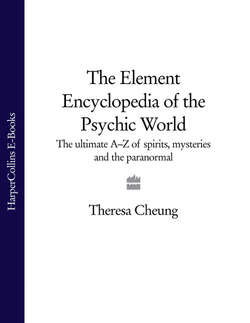Читать книгу The Element Encyclopedia of the Psychic World: The Ultimate A–Z of Spirits, Mysteries and the Paranormal - Theresa Cheung, Theresa Cheung - Страница 217
CROWLEY, ALEISTER [1875–1947]
ОглавлениеCalled by the media ‘the wickedest man in the world’, Aleister Crowley courted controversy all his life with his fascination for sex, magic and blood. Despite his excesses, there are some who think this English occultist was a truly great magician.
Born Edward Alexander Crowley on 12 October 1875, in Leamington Spa, Warwickshire, Crowley was raised by parents who were members of a fundamentalist Christian sect called the Plymouth Brethren. Crowley was drawn to blood and torture from a young age and was branded ‘the beast’ or Antichrist by his mother when he rebelled against the Brethren.
After leaving Trinity College, Cambridge without a degree but fluent in occultism, Crowley joined the London Chapter of the Hermetic Order of the Golden Dawn and quickly advanced up the ranks. He renamed himself Count Vladimir and began to pursue his occult activities full-time in London. Stories began to circulate about his alleged supernatural powers, including psychic attacks on his enemies with demons and vampires. Whether this is true or not is uncertain, but one thing is clear: he had incredible charisma and presence. A disagreement with another Golden Dawn member forced him to leave London and live in Scotland for a time.
Crowley’s sexual appetite was huge. He married twice but had a number of mistresses, and a seemingly unending stream of willing women were attracted to him. He also had a homosexual relationship with the poet Victor Neuburg, who became his assistant in magic.
In 1912 Crowley became involved in the Oro Templi Orientis occult order, becoming its leader in 1922. From 1915 to 1919 Crowley lived in the US before visiting Italy, where he set up his hillside villa called the Sacred Abbey of the Thelemic Mysteries. The villa became the site for his sexual orgies and magical rites, and the behaviour led him to be expelled from Italy in 1923 by Benito Mussolini.
In his later years Crowley was a victim of poor health, drug addiction and financial trouble. He earned a meagre living from his writing, since much of it is incoherent and rambling, but many continue to read his work today. His most important work, The Book of Law, was allegedly communicated from the Egyptian god Horus’s spirit messenger Aiwass. Central to this book is the Law of Thelma: ‘Do what thou wilt shall be the whole of the law’, which Crowley maintained meant doing what you must do and nothing else. His other important work is Magick in Theory and Practise (1929), which many practitioners consider to be a fine work on ceremonial magic. (He spelled ‘magic’ as ‘magick’ to distinguish it from stage magic.)
Crowley’s other published works include The Diary of a Drug Fiend (1922), The Equinox of the Gods (1937), and the Book of Thoth (1944), which is his interpretation of the Tarot. Two volumes of his autobiography were also published. In 1934 he tried to sue Nina Hammett for her biography of him, Laughing Torso, in which she stated that he practised black magic and human sacrifice, but the jury found in favour of Hammett.
Crowley died on 1 December 1947, in a boarding house in Hastings. His final years were spent practising ritual magic with Gerald B Gardner, whom some call the father of modern Wicca. Even though Crowley has been dead for decades, his influence is still very much felt today. One of the many attractions of Crowley’s type of magic was his advice to follow your own way, become your own self and create your own lifestyle - you don’t need a priest or a judge to tell you how to act; you work it out for yourself. It is easy to see how, in the hands of the young, impressionable or immature, this advice can be misinterpreted and become not only misguided but dangerous.
